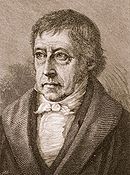- Encyclopedia of the Philosophical Sciences
-

Part of a series on G. W. F. Hegel People Immanuel Kant
Johann Wolfgang von Goethe
Johann Gottlieb Fichte
Friedrich Hölderlin
Friedrich Schelling
Arthur Schopenhauer
Søren Kierkegaard
Baruch SpinozaWorks Phenomenology of Spirit
Science of Logic
Encyclopedia
Philosophy of Right
Philosophy of HistorySchools Hegelianism
Absolute idealism
British / German idealism
Dialectic
Master-slave dialecticRelated topics Right Hegelians
Young Hegelians
Marx's theory of alienation
The Secret of HegelThe Encyclopedia of the Philosophical Sciences (in German: Enzyclopädie der philosophischen Wissenschaften im Grundrisse) (1817) is a systematic work by Georg Wilhelm Friedrich Hegel in which an abbreviated version of his earlier Science of Logic was followed by the articulation of the Philosophy of Nature and the Philosophy of Spirit (also translated as Philosophy of Mind). The work describes the pattern of the Idea as manifesting itself in dialectical reasoning.
While some believe that the philosophy of nature and mind are applications of the logic, this is a misunderstanding. The purpose of the Encyclopedia is descriptive: to describe how Geist (Spirit or Mind) develops itself and not to apply the dialectical method to all areas of human knowledge, but Spirit is in process of growing, like a seed growing into a mature tree: it passes through stages. The first stage of Spirit's development is described in the Logic. Thus the Logic presents the categories of thought as they are in themselves; they are the minimal conditions for thinking anything at all, the conceptions that run in the background of all our thinking. These logical categories turn out to be none other than Geist itself. In order to get at what a thing is, we must think about it. No amount of observing will bring us to the essence of things. Thinking and being are equivalent, and so logic and metaphysics are equivalent as well. The underlying element of it all is Geist; thus the activity of thinking is no less than Geist articulating itself. (This is how Hegel could say that logic is the thought of the mind of God before creation.)
As Geist works itself out more fully, it reaches the point where it simply cannot remain as it is; it is incomplete, and therefore it "others" itself; this is where the philosophy of nature emerges. When this stage of its development is completed, Geist "returns" to itself, which is the emergence of the philosophy of mind.
English translations of all three parts are available from Oxford University Press, with each part bound as a separate book.
Bibliography
- The Encyclopaedia Logic: Part 1 of the Encyclopaedia of Philosophical Sciences, trans. T. F. Geraets, W. A. Suchting, and H. S. Harris, (Indianapolis: Hackett, 1991).
- Philosophy of Nature (Part Two of the Encyclopaedia of Philosophical Sciences), trans. Michael John Petry, 3 vols, (London: George Allen and Unwin, 1970).
- Hegel's Philosophy of Mind: Being Part Three of the Encyclopaedia of Philosophical Sciences, trans. William Wallace, (Oxford: Clarendon Press, 1971).
External links
- E-text of Enzyklopädie der philosophischen Wissenschaften im Grundrisse
- E-text of the Wallace Translation of Part Three of the Encyclopaedia
- Deutsch - 3 vol. Enziclopadie + Russian Translation of The Philosophy of Mind by B.A. Fogt + Russian comment in context artificial intelligence Link
- Hegel's Encyclopaedia of the Philosophical Sciences in Outline
- Hegel : The Encyclopaedia Logic (with the Zusatze). tr. by T. F. Geraets, W. A. Suchting, and H. S. Harris, 1991.
Categories:- 1817 books
- Oxford University Press books
- Works by Georg Wilhelm Friedrich Hegel
- German idealism
- Logic literature
Wikimedia Foundation. 2010.
